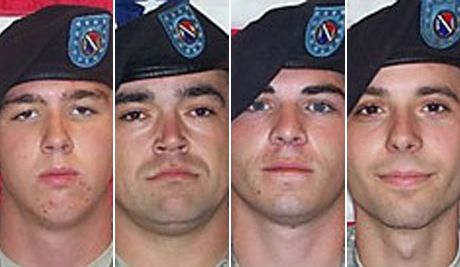By TAIMOOR SHAH and ALISSA J. RUBIN
KANDAHAR, Afghanistan — It was difficult enough for the people of western Kandahar Province. They are beleaguered both by the Taliban, who control the roads, demand taxes and execute anyone suspected of disloyalty, and by the American military, who often show little regard for people and whose demands that locals stand up to the insurgents seem unreasonable.

Andrew Holmes, Michael Wagnon, Jeremy Morlock and Adam Winfield are four out of five US Stryker soldiers who face murder charges. (Photograph: Public Domain)
Still, there was no reason to anticipate something far worse: American soldiers suspected of being a sadistic rogue band led by Sgt. Calvin Gibbs.
For Mullah Allah Dad, a poppy farmer and the mullah of a hamlet of just 15 homes in Kandahar Province, the end came quickly. He was sipping tea when he heard screams, and several of his children ran in. American soldiers in tanks were coming, they told him. Moments later, two young soldiers came in and grabbed him, his wife, Mora, said.
“In a minute I heard shooting,” she said. “I saw my husband face down, and a black American stood next to him. Another soldier pushed me away. They pushed me back into the house and the interpreter made me go inside one of the rooms.
“Minutes after that I heard an explosion,” she said. “I rushed out of that inner room and out the gate and the translator was telling me to stop, but I did not pay any attention, and then I saw my husband, my husband was burning.”
According to court papers filed by the military, Mullah Allah Dad, 45, of the Kalagi hamlet, was the third victim of soldiers who killed Afghan civilians for no apparent reason.
Five of the platoon soldiers have been charged in at least three murders, one of them Mullah Allah Dad’s, and seven other soldiers have been charged with crimes including assault, the use of hashish and attempts to impede the investigation.
The New York Times sent an emissary to Maiwand, the western district of Kandahar where the killings took place, to find the families of the three who were killed. Mullah Allah Dad’s family was afraid to come to the provincial capital to meet with a Times reporter because they feared that coalition troops might again attack them or that the Taliban would stop them. They agreed to come only as far as a nearby village that had cellphone coverage, and they were interviewed by phone.
Mrs. Dad described how the soldiers searched the family’s house, apparently trying to justify the killing. “They tore and broke everything,” she said. “But they did not find a single bullet in my home.”
Later, Mrs. Dad’s father, Abdullah Jan, and two tribal elders listened in disbelief to an Afghan intelligence agent at the district governor’s office as he related his conversation with American soldiers when they handed over Mullah Allah Dad’s body.
“He told me that the Americans claimed that Allah Dad had a grenade and was going to attack them, and then the grenade went off and he was killed,” said Mr. Jan. “I tried to explain his background, that he was a mullah in his village mosque, he had no link with the Taliban and he didn’t want one.
“They put the grenade under his body,” he said.
An hour later, Mr. Jan said, he picked up his son-in-law’s body and was shocked to find that it was wrapped in a black plastic bag. “It was treated like garbage,” he said.
Just a mile or two from Kalagi, near the village of Karez, another man died in almost the same way.
Gulbaddin, 37, was moving into his new home on a chilly January day when American soldiers came in several armored vehicles to the village, said Haji Abdul Qayoum, a neighbor and tribal elder there. “His son was crying, but the soldiers did not care,” he said. “He was shot right before his home and with his son there.”
Mr. Qayoum, at the request of The New York Times, went to ask Gulbaddin’s father if he would discuss his son’s death. His response was the cry of every father who has lost his child.
“Don’t talk about my son,” said Gulbaddin’s father. “My mind is not ready even to hear his name. Even you mentioning his name makes me angry and puts my heart in pain. Please, please don’t hurt my heart.”
Local elders estimate that in the past eight months at least 42 civilians have been killed in Maiwand during American operations. The Taliban have also killed civilians in the district, but it is the 42 whose deaths are etched in local memory.
“I am from the area, and my family has been living here for centuries,” said Haji Hayatullah, an elder from Maiwand District. “I know the people who are supporting the Taliban and the people who are not. But the Americans have killed many people who did not support the Taliban, which is painful for us and actually creates hatred toward Americans. And that is why there is little or no help to the Americans from the civilians here.”
“For us, death is inevitable, but not in the way they have been killing.”
The family of Mullah Allah Dad has received no apology and no compensation for his death, his father-in-law said.
A spokeswoman for the Army, Maj. Kathleen Turner, said she could not answer any questions about the case because of the continuing investigation.
Taimoor Shah reported from Kandahar, and Alissa J. Rubin from Kabul, Afghanistan.



